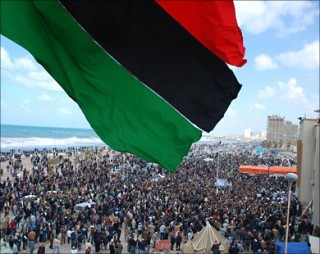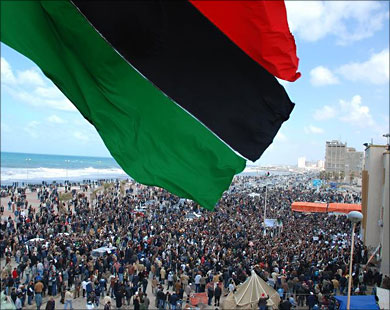 So how can Libyans and the world avoid the Iraqization of Libya?
So how can Libyans and the world avoid the Iraqization of Libya?
by Juan Cole
The Libyan intervention was legal in international law, authorized by the UN Security Council, and so can hope to have a better outcome.
The illegal American invasion of Iraq and subsequent occupation was so epochal a catastrophe that it spawned a negative phrase in Arabic, “to Iraqize” or `arqana. Tonight I heard an Alarabiya anchor ask a spokesman for the new government in Libya whether there as a danger of the country being “Iraqized.” He was taken aback and asked her what she meant. Apparently she meant chaos, civil war, no services, etc. (Those Neoconservatives who trumpet their Iraq misadventure as a predecessor to the Arab Spring should take a lesson; no one cites Iraq among the youth movements except as an example of what must be avoided).
The Libyan intervention was legal in international law, authorized by the UN Security Council, and so can hope to have a better outcome. So how can Libyans and the world avoid the Iraqization of Libya?
1. No Western infantry or armored units should be stationed in the country. Their presence would risk inflaming the passions of the Muslim fundamentalists and of the remaining part of the population that is soft on Qaddafi. The presence of Western troops in Muslim lands creates terrorism, which then produces calls in the West for more Western troops, which creates more terrorism. It is the dialectic of a horror movie. The hawks who believe people can be bludgeoned into acquiescence have been proven wrong over and over again, in Palestine, Afghanistan, Iraq, etc. If large numbers of Western troops could always prevail, the Algerian Revolution of 1962 could never have succeeded.
The Qaddafi government collapsed in the east of the country in February, and Benghazi, al-Bayda, Dirna and Tobruk have been tolerably stable. There is no reason to believe that the west of the country need be less so once the fighting subsides. Security is not perfect, but let the Libyans supply it. Already in Tripoli, neighborhood watch groups have been formed to supply local security, and aside from the hated Bab al-Aziziya compound, there has been little looting.
2. As much as possible of the current bureaucracy, police and army should be retained. Only those with innocent blood on their hands or who were captured rather than surrendering or switching sides should be fired. The EU is doing the right thing in trying to ensure the bureaucrats get paid their salaries in the aftermath of the fall of Tripoli. The descent of Iraq into looting under Rumsfeld in spring of 2003 marked the beginning of a long gap in security. In Iraq, Ahmad Chalabi fired tens of thousands of capable Sunni Arabs who had been mid-level Baath Party members, thereby depriving the country of the people who knew best how to accomplish things and deliver government services, and driving them into violent opposition instead.
3. Some Libyans are complaining about the prospect of retaining the same police as in the old regime, and want local security committees instead. A compromise would be to establish a strong civilian oversight over police.
4. Avoid being vindictive toward former Qaddafi supporters, and avoid purging all but the top officials from the body politic. Egypt perhaps hasn’t gone quite far enough in removing Mubarak cronies, which provoked the July demonstrations. And it is important to prosecute secret police and others with blood on their hands. But moderation and wisdom should be used, in hopes of knitting the body politic back together. Note that once the Anglican Church in the United States renounced allegiance to the British king, it was given full rights in the new American republic, even though Anglicans in general had opposed the revolution.
5. Avoid a rush to privatize everything. Oil countries anyway inevitably have large public sectors. Impediments to entrepreneurship should be removed, but well-run state enterprises can have their place in a modern economy, as some of the Asian nations have demonstrated. Rajiv Chandrasekaran demonstrated in his Imperial Life in the Emerald City how the US fetish for privatization destroyed state factories that could otherwise have been revived and that could have supplied jobs.
6. Consult with Norway about how it is possible for an oil state to remain a democracy. The petroleum income can make the state more powerful than civil society, and there is [pdf] a statistical correlation between have a state that depends heavily on a single primary commodity and a tendency to despotism (as well as a tendency toward violence, since such commodities can be smuggled and cartels emerge to fight over smuggling rights). These problems of dependence on a high-priced primary commodity can be seen in Iraq, where the prime minister has increasingly become a soft strong man, in part because of government petroleum revenues.
7. Use the Alaska dividend system to share the oil wealth with Libya’s 6.5 million people. This model was often discussed with regard to Iraq but was never implemented.
8. Democratization and economic growth cannot be attained through oil exports alone. Having a pricey primary commodity like petroleum causes a country’s currency to harden. A harder currency means that manufactures, handicrafts, and agricultural produce from that country artificially cost more to countries with softer currencies. This effect is called the “Dutch disease” because the Netherlands developed natural gas in the late 1960s and found it actually hurt some parts of their economy. The cure is to diversify the economy. The most clever way to do so is to use the petroleum receipts to promote other industries and services. Libya has a high literacy rate and could potentially attract investors to put its population to work in other sectors.
9. Recognize Berber as a national language. The TNC has stress that the new Libya will be pluralist and multicultural, and the new constitution does not assert that Libya is an Arab state, as the intrepid Brian Whitaker has pointed out. There is no reason for which the important Berber minority should not be given its due. It is obviously important for national unity there be a strong Arabic component in the schools.
10. Once it gets on its feet socially and economically, Libya should go forward with bruited plans to get into solar and wind energy big time. Petroleum will always have value in petrochemicals, but burning it is bad for the earth because extra carbon in the atmosphere causes global warming, which will hit Libya especially hard. It is a delicious irony that the petroleum revenues could make it possible to ease the transition to solar power. Libya’s big desert is ideal for photovoltaic panels. Transitioning away from petroleum exports as the major industry would help economic diversification and increase the likelihood of a retention of democracy, as well as likely contributing to social peace. Not to mention that you don’t want it hotter in Libya in the summer than it already is.
ABOUT THE AUTHOR : Juan Cole is Richard P. Mitchell Collegiate Professor of History at the University of Michigan. For three decades, he has sought to put the relationship of the West and the Muslim world in historical context. His most recent book is Engaging the Muslim World (Palgrave Macmillan, March, 2009) and he also recently authored Napoleon’s Egypt: Invading the Middle East (Palgrave Macmillan, 2007). He has been a regular guest on PBS’s Lehrer News Hour, and has also appeared on ABC Nightly News, Nightline, the Today Show, Charlie Rose, Anderson Cooper 360, Countdown with Keith Olbermann, Rachel Maddow, the Colbert Report, Democracy Now! and many others. Read more
ATTENTION READERS
We See The World From All Sides and Want YOU To Be Fully InformedIn fact, intentional disinformation is a disgraceful scourge in media today. So to assuage any possible errant incorrect information posted herein, we strongly encourage you to seek corroboration from other non-VT sources before forming an educated opinion.
About VT - Policies & Disclosures - Comment Policy




